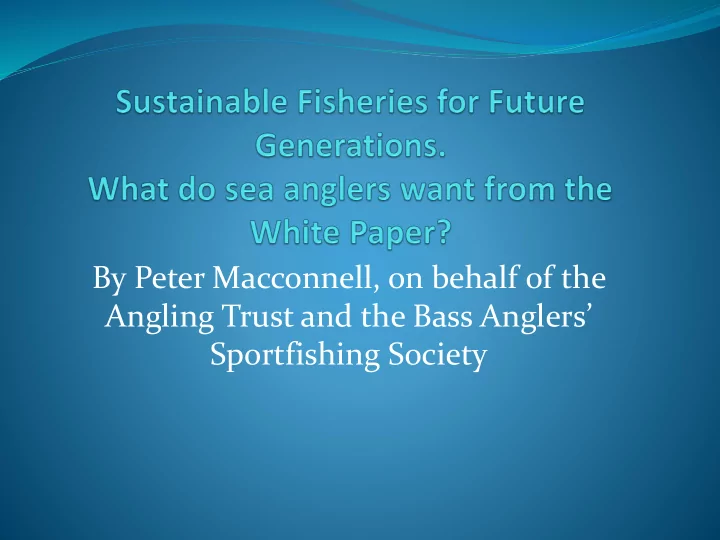

By Peter Macconnell, on behalf of the Angling Trust and the Bass Anglers’ Sportfishing Society
What recreational sea anglers want: Specific proposals within the White Paper about how RSA can be developed, post Brexit, for this ‘sustainable future’. Clear acknowledgement of the economic and social benefits of RSA and how this will acted upon. Specific actions and not just generalisations.
What can Plymouth CC do? Include specific proposals for the development of RSA, in its final submission to Government. Emphasise the socio-economic value of RSA to the City. Invite local businesses and suppliers who deal with RSA to have input to this process (it is noticeable that in the list of invitees today there are no tackle dealers, bait suppliers, charter boat skippers, chandlers, or small boat builders/repairers. Nor are there any visits planned). Understand the very important place that Plymouth has played and continues to play in RSA.
Some facts: From Invest in Fish – South West (2004): 240,000 resident participants in RSA 750,000 visitor days coming from outside the region. Nationwide: Pattern replicated in coastal communities. 350-400,000 fish for bass alone. Perhaps 1 million across all species.
What are the socio economics? Again in the Southwest alone: £165 million in expenditure. Up to 3,000 jobs in sectors such as tackle shops, bait and charter boats (26,000 Nationwide) Nationwide: Net Benefits -2004 - estimated the value of RSA at about £650 million. Sea Angling 2012 – estimated 884,000 RSA spending £1.23 billion (£831 million after removing imports and tax)
The socio-economics (from SA2012): 4 million days of sea angling per year Shore fishing the most common way to fish 1 million days aboard private or rented boats For individual trips, the largest areas of spend were: Accommodation and food Boat hire and chartering Bait Largest annual spending was on boats and boating equipment, and fishing tackle
What this means for Plymouth Plymouth is one of the premier sea angling centres in the country (only Poole and Weymouth larger) Large local RSA population and many RSA clubs. Regular visitors from other areas – tourist benefits out of main season All the items RSA purchase can be, and are purchased in Plymouth. Sea angling is a healthy activity for adults, children and families. It makes economic sense for Plymouth to actively support RSA.
A sea angling strategy? In 2007 Defra was drafting a Recreational Sea Angling Strategy to: “Capitalise on the potential of sea angling to optimise the economic and social return to coastal economies and society.” Somehow this got lost or forgotten in various Government changes. Now it reappears in vague terms in the outline for this White Paper
What the White Paper outline says: "Recreational angling is a popular sport in England bringing both economic and social benefits to the UK. Defra will look at how to further integrate recreational angling into fishery management governance and decisions. This could include managing some stocks specifically for the recreational angling sector only.“ "We will consider how we can further integrate recreational angling within the new fisheries framework recognising the societal benefits of this activity and impacts on some stocks.“ "Q12: Do you agree that there is a case for further integrating recreational angling into fisheries management?
We have heard all this before: In 2004 the ‘Net Benefits’ report stated: The fisheries departments should reform inshore fisheries management and give a focus on developing the sector, including explicit management of recreational sea angling interest.“ But can Brexit mean a better future for recreational as well as commercial fishing? Only if there are plans to ‘develop’ and not just ‘manage’ the sector.
Some progress? Recreational sea anglers on most IFCAS More data about the economic and social value of RSA. This White Paper and Marine Bill a vital moment. But only if Plymouth City Council and others understand the value of RSA to their city and their citizens.
References In this presentation figures are quoted about (for example) the socio- economic value of sea angling. The sources are as follows: Invest in Fish South West Report - EAA - European Anglers Alliance https://www.eaa-europe.org/.../the-motivation-demographics-views-of-sw- recreational... The Motivation, Demographics and Views of. South West Recreational Sea Anglers and their Socio-economic Impact on the Region. Sea Angling 2012 – a survey of recreational sea angling ... - Defra, UK randd.defra.gov.uk/Document.aspx?...12025_SeaAngling2012synthesis reportFINAL... Recreational sea fishing, the high value forgotten catch http://www.ices.dk/news-and-events/news- archive/news/Documents/Pages%20from%20ICES%20Insight%202014.p df
Recommend
More recommend